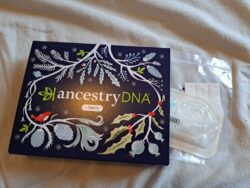Anyone who knows me will know I absolutely love coffee.
From winding up everyone in the office every morning with my obnoxiously loud coffee grinder, to asking my boyfriend to bring me a cup as soon as I wake up on the weekends, I can’t do without it.
But do I just love the caffeine hit because I grew up watching my parents drink it, or because I’m a tired journalist working shifts?
It turns out, the answer could lie within my DNA.
So I tried the Ancestry DNA traits kit, which takes a look at particular ‘markers’ in your genetic make-up which suggest particular aspects of your personality, health and appearance may be to do with biology.
I must say I was sceptical, but I’m no stranger to DNA testing kits and decided to give it a whirl.
Just like other testing kits I have previously done, the Ancestry DNA kit required me to take a simple cheek swab and then register on its website – then pop my saliva samples in the post.
It took just a few weeks for my results to come back, and when they did the results were intriguing.
The Ancestry DNA kit came in a simple box with easy instructions (Picture: Sian Elvin)
I logged straight onto my ‘traits’ page and discovered things about myself that were likely determined by my DNA – like my wavy hair, light eyes, lighter hair colour and that I have all my wisdom teeth – which were not overly surprising.
It did however pick up some parts of my personality which I would have assumed were nurture rather than nature.
The test recognised I am extroverted, neither a morning person or night owl, and that I tend to be risk-averse – all of which is true.
It suggested I am predisposed to lower-than-average levels of vitamin B12, I’m a moderate caffeine drinker and I don’t have the gene which makes me think coriander tastes like soap.
Pleasingly, it found I have DNA differences commonly found in elite endurance athletes. But apparently I’m also more likely to sneeze in bright sunlight.
I spoke to Laura House, a genetic genealogist at Ancestry ProGenalogists, about what it all means and how I can interpret my new-found knowledge.
The website has two categories of trait: ones ‘literature-based’ on peer-reviewed journals and polygenic risk score ones, surveys which were carried out in-house by Ancestry.
According to my genes, I’m more likely to be a moderate caffeine drinker. Nothing to do with the early starts at all, I am sure… (Picture: Getty Images)
My genetic markers also suggest I am more likely to enjoy the taste of fresh coriander (Picture: Getty Images/fStop)
‘Being aware of our genetic predispositions can therefore help us understand and manage them,’ Laura said.
‘The principle of the system is this: DNA is a substance in our bodies that affects almost every aspect of our appearance and character. It isn’t the only factor affecting those characteristics, but combines with other environmental, cultural and social factors to make us who we are.
‘To discover which genes are affecting which traits, our scientists look at the correlation between the presence of a gene and the expression of a trait.’
I have the genetic markers associated with caffeine consumption, which means I share genes in common with people who were found in a study to drink a lot of caffeine.
Sometimes though, your DNA doesn’t always match how your traits display in real life because environmental factors may have a greater impact on you.
Is sending off my DNA to be tested safe?
Ancestry, and a number of other similar companies, say they take every measure to protect the DNA and data of users, and it’s a top priority.
The company’s website says: ‘Your Ancestry DNA results are stored in a secured database, which employs a number of security measures. As well as protecting the information from unauthorised access from those outside of Ancestry DNA, we strictly limit access to this database from within the company as well.
‘After testing is complete, any remaining DNA from your test is archived and stored in a temperature-controlled, secure facility with 24-hour monitoring and limited access.
‘Once a DNA test result is deleted, that choice is permanent.’
Experts recommend people use well-known websites where information can easily be deleted if they are going to DNA test, and say although the risk of hacking or data loss is likely very small, users should still be aware of it.
For example, genetic markers may indicate someone is less likely to drink caffeine, but if they work night shifts that may change their behaviour.
‘DNA testing gives us the opportunity to think about nature versus nurture, and the role our genes play in our appearance, character, sensory experiences, and even our nutrient intake,’ Laura added.
‘As a student I used to study from about 10pm until the early hours of the morning, and it was something over which I felt I had no control – as I was more focused at night than at any time during the day.
‘There was something vindicating about discovering from AncestryDNA that I am “more likely to be a night person than 80% of the population” – meaning that my experience of “coming to life” at night was rooted in a real biological process, rather than an unwillingness to try harder.’
She said as well as it being ‘fascinating’ to compare your personality traits with family members, it could open up a whole world of possibilities in the future with ‘ground-breaking discoveries’.
‘This technology is so new and the field is developing so rapidly that the sky is the limit,’ she explained.
‘Years from now we are likely to have a much better grasp of the extent to which our personalities, our skills, and our experiences of the world are determined by our genes.’
So aside from learning I have little genetic excuse to be slower when I’m working the early shift, there may be more revelations to come about my personality in later years.
But now, because it’s in my nature, I’m off to make a cup of coffee.
Graphic by Myles Goode for Metro.co.uk
Get in touch with our news team by emailing us at webnews@metro.co.uk.
For more stories like this, check our news page.
Is it nature or nurture?





